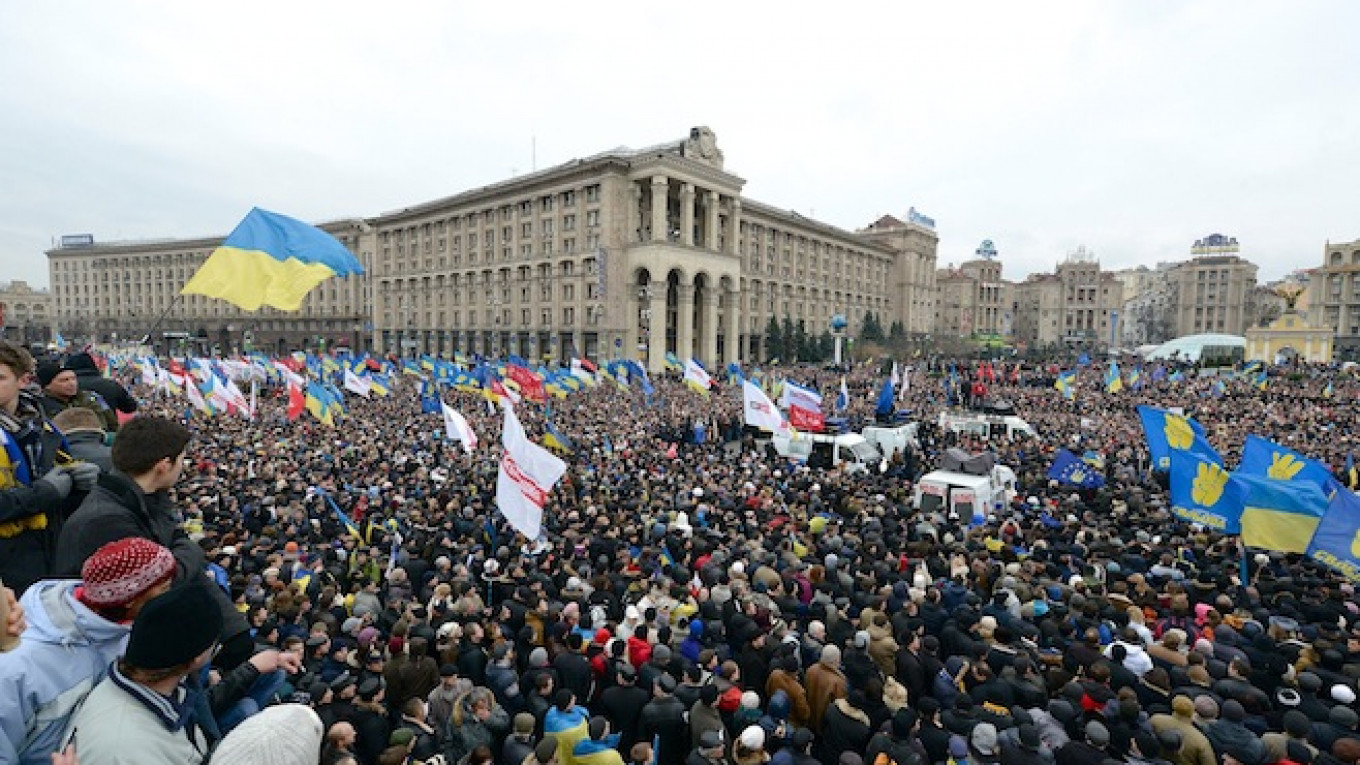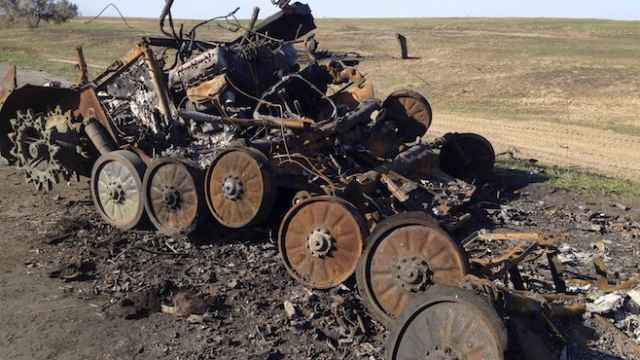In the afternoon of Feb. 20, after the morning's dead had been cleared away, Volodymyr Melnychuk arrived outside Kiev's October palace.
Higher up the hill stood the seats of Ukrainian government, defended by thousands of police. Below lay Independence Square, or Maidan, covered in protesters' camps and scarred with barricades and the detritus of battle.
In fierce clashes that morning scores of protesters and government forces had been killed. Calm now prevailed, and Melnychuk, a handyman who helped build barricades at the protests, had arranged to meet a friend at the palace's white portico.
A bullet hit him as he stood next to his partner of 13 years, Maria Kvyatkovska. The shot entered Melnychuk's left cheek and exited near the back of his neck, felling him instantly.
"He was chatting on the phone, just standing there. The sun was shining," recalled Kvyatkovska, an accountant. "It was calm in the Maidan. Nobody expected it." Melnychuk, 39, was declared dead that night.
Like many Ukrainians, Melnychuk and Kvyatkovska had first gone to the Maidan late last year because they wanted their country to forge closer ties with the European Union. They were angry that President Viktor Yanukovych had rejected a Ukraine-EU treaty and pursued closer links with Russia instead.
When police beat protesters soon after the demonstrations started, Kvyatkovska's views had hardened.
"It wasn't about the EU" after the beatings, she said. "It was anger about power." She realized that real change would require a complete overthrow of a corrupt system that favored a small elite and wealthy oligarchs.
Eight months on, she and millions of other Ukrainians are still waiting for their revolution.
Though Yanukovych fled in the face of the protests, and Russia seized Crimea, Ukraine's political system remains largely unchanged. This weekend voters will get a chance to elect new lawmakers, but many are dismayed that the electoral system itself has not been reformed. Half the parliamentary seats remain open only to party candidates, and parties give limited information about who their candidates are.
Interviews with protesters, Ukrainian and European politicians, and police, many detailing their roles for the first time, show how Ukraine's unexpected revolution has left people divided and dissatisfied.
Many Ukrainians are mindful of the Orange Revolution of 2004. That uprising, too, targeted Yanukovych after a presidential election rigged in his favor. His fall generated initial optimism but did not deliver lasting change. His successors failed to tackle corruption or heal the country's east-west divisions, and Yanukovych was elected president in 2010.
A survey conducted early last month by USAID, a U.S. government agency, found that 74 percent of Ukrainians have little or no confidence in their parliament. Even outside Yanukovych's former stronghold in the troubled eastern Donbass region, only 39 percent think the political system is democratic.
Vitaly Klitschko, mayor of Kiev and leader of the anti-Yanukovych Udar party, feels the frustration. "Right now people have a big expectation of reform ... and many of them are very unhappy because they know the faces have changed, but the system is still the same," he said.
How could the hopes of February have turned so quickly to disillusion and anger? The following account of the last days of the uprising shows that the seeds of today's disappointment were there all along: in the chaotic nature of the protests, in the conflicting goals of different protesters, and in the sudden toppling of Yanukovych.
His overthrow caught the West unprepared. EU foreign ministers had planned on a slow transition in Ukraine, with Yanukovych staying in power for almost a year.
Opposition politicians also misread the mood of the Maidan. Coming largely from the country's Western-leaning and Ukrainian-speaking areas, they did little to win over Yanukovych's supporters in the Russian-speaking east. They now hold power, but have yet to deliver the reforms for which ordinary protesters fought and died. Without fundamental change, some protesters say, there could be another Maidan.
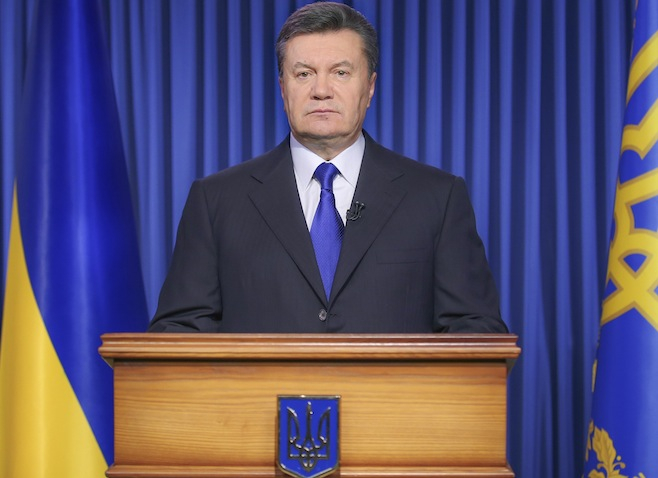
Ukraine's President Viktor Yanukovych makes a statement in Kiev in this Feb. 19, 2014 file photo.
Turning Violent
In late 2013, students gathered in central Kiev's European Square to protest against Yanukovych's rejection of closer ties to the EU. The police moved in and beat them. Thousands more people occupied nearby Independence Square.
The protesters all wanted change, but unanimity stopped there. Some Ukrainians came because they wanted Kiev to forge ties with the EU; others wanted an end to the corruption endemic among Yanukovych's cronies; still others wanted to reverse changes that had boosted the president's powers and diminished parliament.
Protesters formed a makeshift, crowded encampment in the square. There was no single leader. Instead, various groups with their own commanders acted in loose alliance against the common enemy. The protesters ranged from ordinary professionals such as Kvyatkovska to hard-bitten anti-Russian nationalists in paramilitary uniforms.
Feb 18: Shooting Breaks Out in Kiev
In mid-February, opposition politicians pressed Yanukovych to curb his powers. The state security service threatened "tough measures" if street disturbances did not end. This toxic brew boiled over on Feb. 18 when protesters confronted police near Ukraine's parliament, the Verkhovna Rada.
As clashes spread, shooting broke out. Protesters blame the police. Taras Talmonychuk, a 32-year-old who works in digital advertising, was on the Maidan at the time, bringing supplies to people at the barricades.
"I helped carry a man who was shot but alive, and I watched as his pulse stopped. It was the first time I had seen a death."
Talmonychuk had joined the protests because he opposed closer ties with Russia. "I am not for the EU or for Russia. Ukraine is another thing. It's independent," he said. As with others, his experience of violence against protesters made him more determined to act. After helping to carry the shot man, Talmonychuk told his boss at work he would be away for a few days, bought a helmet and protective goggles and joined the front line.
The police saw matters differently. Oleh, a former officer in the Berkut riot police who was on the streets of Kiev that day, said in an email interview that the police had simply tried to stop people entering the parliament building. Protesters, he said, had attacked with stones, Molotov cocktails, sticks and metal pipes, and then begun shooting.
"Just from our unit, more than 10 officers were wounded, two badly," he said. "My comrade was standing right next to me, all of two meters away, and was shot — the bullet went straight through his body armor." That evening, a policeman died on Instytutska Street when he was hit by a firework set off by protesters, he said.
The police deployed two armored personnel carriers to push into the square. Protesters set barricades alight and hurled paving stones and Molotov cocktails; 25 people died, including nine police, the health ministry said at the time.
Yanukovych posted a message online accusing his rivals of trying to "seize power" by means of "arson and murder." He agreed a truce to allow negotiations "in the interests of social peace."
But even as the president posted his appeal, the Maidan began to receive reinforcements from sympathizers outside Kiev. Some brought guns, according to police and one protest leader.
Feb. 18-19: Lviv's Night of Wrath
Pro-European Ukrainians outside the capital had been protesting for months, particularly in Lviv in the west of the country where support for the EU and ties to Poland are prevalent. One prominent figure was Andriy Porodko, who worked for an organization helping children with special needs. Porodko organised a blockade against a Lviv Interior Ministry compound, complete with tents and kitchens.
On the night of Feb. 18 to 19 — the Night of Wrath, as it became known in Lviv — tensions erupted. Police stations and the Interior Ministry building were set on fire. Some police removed weapons from the stations before they were overrun, said Porodko; others were looted. His team sent to Kiev three mini-buses loaded with armored vests, helmets and shields for the protesters.
"We didn't have weapons or arms" to send because the arms depot had burned, he said. "But there were widespread cases of sending arms to Kiev."
Several protesters in Kiev said the only guns they saw on the protesters' side were air rifles. How policemen came to be shot, they said, was unclear.
But Oleh, the Berkut officer, said he is sure the protesters had weapons. On Feb. 19, "lots of weapons were delivered to the Maidan," he said. The deliveries "did not go unnoticed by the police."
Feb. 19: Last-Ditch Diplomacy
In Europe, politicians still thought Ukraine's woes could be settled through negotiation. They believed their best hope was to strike a compromise with Yanukovych.
Watching events from afar was Radoslaw Sikorksi, then Poland's foreign minister, who was with his family skiing in the Alps. Sikorski grew up in Poland. A graduate of Oxford University, he has a deep antipathy to communism and the autocratic rule of President Vladimir Putin.
Aghast at the violence in Kiev and at Yanukovych's cosying up to Putin, Sikorski rang Poland's cabinet secretary on Feb. 19 to get a green-light to visit the Ukrainian capital to help broker a truce. He then called Brussels to get backing from the EU's high representative for foreign affairs, Catherine Ashton, he said in an interview. Ashton was non-committal.
Walking along a cross country ski trail, Sikorski rang Frank Walter Steinmeier, the German foreign minister, who agreed to go to Kiev. Sikorski suggested Steinmeier try to get French Foreign Minister Laurent Fabius on board. Then Sikorski rang Ashton again and told her that Steinmeier and perhaps Fabius would come. "She said, 'Alright, go.'"
By that evening Sikorski was in Kiev, where rumors circulated about the Ukrainian authorities contemplating military force. Like other diplomats, the Pole thought Yanukovych would do anything to stay in power.
"It gelled with our information about at least one brigade being moved from the army to the Interior Ministry, presumably with the wish to use it in what Yanukovych ... was calling an 'antiterrorist operation,'" said Sikorski.
The government did contemplate using the army against protesters, according to General Volodymyr Zamana, former chief of staff of Ukraine's armed forces. Though the Interior Ministry had deployed riot police — the Berkut — the government had also been laying plans to use the army, Zamana said in an interview.
Yanukovych did not personally give him orders to use the army, he said, but senior officials in Yanukovych's government wanted to.
"Personally from him [Yanukovych], I didn't get such tasks. But I think that such proposals went to Yanukovych," he said.
Battalions from Crimea and southern Ukraine came to Kiev, Zamana said. But he refused to countenance an army intervention and was sacked on Feb. 19.
"I lost any right to give orders," Zamana said. A directive allowing the use of the army was then signed, though never implemented, he said.
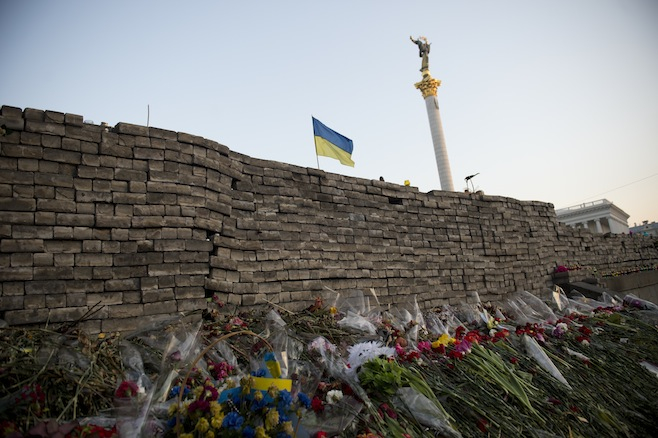
A wall of flowers commemorates the victims of clashes between government forces and Maidan protesters.
Feb. 20: A Bloody Morning
In Kiev ahead of his EU colleagues, Sikorski planned to visit the Maidan early on Feb. 20 before talks with Yanukovych and opposition leaders. But as he ate breakfast, his Ukrainian security detail said it was too dangerous to go to the square. It was a measure of how events on the street were moving ahead of those in political circles.
Sikorski changed plans and met protest leader Andriy Parubiy at a church a few hundred meters from the Maidan. That morning shooting started again.
The main body of protesters was to the west of a barricade that ran diagonally across one end of the square. Government forces were concentrated in the east, towards the Presidential Palace.
"There were stun grenades, loud bangs" and the sound of shots, said Talmonychuk, the protester who had bought a helmet and goggles for protection. Police, he alleged, tried to set a building on fire with Molotov cocktails. The protestors put out the fire and started to push the police back.
Something, possibly a rubber bullet, smashed into Talmonychuk's goggles and made him pause. He did not want his young son growing up without a father and so stayed inside the barricade. That, he said, "was the thing that saved my life."
Oleh, the Berkut officer, said police officers near the square's monument came under fire at about 8 a.m. "The officers began reporting on the radio that they were being shot at and needed help, but none of our commanders answered them," he said. The officers fell back, "but this only provoked those socalled 'peaceful' protesters — it appeared as if the police officers were retreating."
Official investigations into the shootings have made little progress. Three Berkut officers have been charged with killing 39 protesters. This month, journalists reported on major flaws in the case against the three men.
Witnesses say Yanukovych's police were not solely to blame. Video footage shows police officers firing weapons; some protesters believe a special sniper squad was operating on the government side. At the same time, supporters of Yanukovych believe provocateurs intent on inflaming the situation were shooting from the protesters' side. Talmonychuk said that one of his friends found a used cartridge on the protesters' side of the barricades; he said it was possible it came from someone firing at the police.
Feb. 20: 'Putin Is Calling'
It was against this chaotic backdrop that the EU foreign ministers gathered to negotiate with Yanukovych. As accounts of those involved show, the ministers and the rival political leaders who eventually took over from Yanukovych set out to get the president to compromise, rather than force bigger changes.
When German Foreign Minister Steinmeier arrived at the German Embassy in Kiev that morning, he met Sikorski and Fabius, the French foreign minister, and three Ukrainian opposition leaders. The three Ukrainians were Klitschko, head of Udar, a pro-EU and anticorruption party that lacked experience; Arseny Yatseniuk of the pro-European and liberal-leaning Batkivshchyna, or Fatherland party, headed by Yulia Tymoshenko, who was in jail and who had lost much of her previous popularity; and Oleh Tyahnybok, leader of the far-right nationalist Svoboda party.
All drew most of their support from central and west Ukraine. They offered little cohesion in a fractured country.
Nevertheless, Sikorski recalled, "they were quite reasonable. They wanted the old, more democratic constitution back, and they wanted an end to the killing, obviously."
After the meeting, the EU foreign ministers discussed how to approach Yanukovych about stepping down. Sikorski had negotiated with him before and guessed what would happen. "He would start talking and ... it would be impossible to break in," Sikorski said. "So we pre-agreed that Steinmeier would quite quickly interrupt him and tell him to get real."
At the presidential palace, guarded by ranks of helmeted police with metal shields, Yanukovych began sounding off about how bad his political opponents were and how reasonable he was, Sikorski said. Steinmeier interrupted and said Yanukovych had to strike a deal with the opposition.
"And he didn't question that," said Sikorski. "His idea was yes, there needs to be a deal and yes, we need to change the constitution. But he refused to talk about dates."
Sikorski thought Yanukovych was playing for time and told him he had to declare a resignation date.
An aide entered the room and passed a piece of paper to Yanukovych.
"He said, 'Putin is calling, I have to go,'" recalled Sikorski. The president was gone about 40 minutes. When he returned he said nothing of his call, but said: "Alright, I will go, I'll go before my time is up."
That evening the EU ministers and Ukrainian opposition leaders returned to the presidential building to thrash out details with Yanukovych and his aides. They met in a rococo paneled room, and were joined by Vladimir Lukin, a representative sent by Putin. Food and drinks were served. Out on the Maidan, the barricades smouldered.
Sikorski was struck by the contrast between the brutality in the square and the easy familiarity of the Ukrainian politicians as they talked with Yanukovych: "These guys were sort of on first name terms and quite familiar with each other." It was a hint of how significant change in the political system was unlikely to happen quickly no matter who was in charge.
As discussions dragged on, Yanukovych appeared undefeated. He was "living in an illusion," said Klitschko, who sat across the table. "I tried to explain to him about the situation in the street, in the country ... I have a feeling he did not realize what was happening."
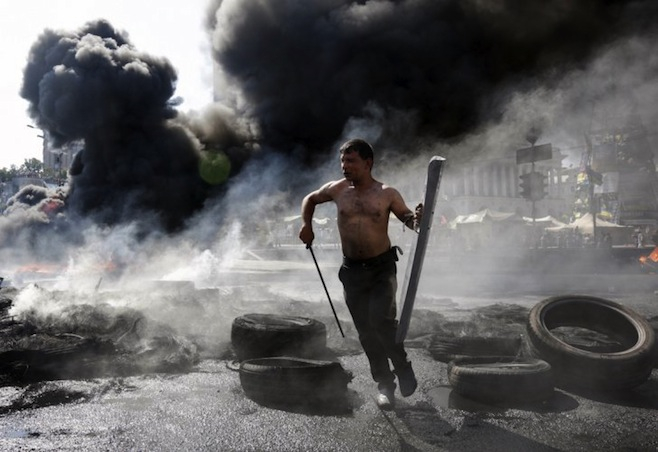
Konstantin Chernichkin / Reuters
A protester runs during clashes with pro-government forces at Independence Square in Kiev Aug. 7, 2014.
Feb. 21: The Downfall
By 7 a.m. the two sides had a draft. Yanukovych would agree to constitutional reform and an early presidential election. But he would remain president for almost a year.
The participants left to grab a few hours sleep, agreeing to regroup for a formal signing ceremony at 11 a.m. As the time approached, Klitschko and the other opposition leaders were absent. The politicians had struck a deal to keep the country together — but they had misjudged the protesters in the square.
A former heavyweight boxer who won 45 of 47 pro fights, Klitschko is 2 meters tall and once had the nickname Dr Ironfist. That morning he and other opposition leaders faced a verbal onslaught from Maidan representatives in a meeting at the Kiev Hotel.
The protesters thought the draft deal was weak and unacceptable.
Klitschko called the EU ministers. When they arrived, Steinmeier made an emotional appeal: "You have the fate of Ukraine in your hands," he told the protest leaders. "Ukraine is standing at the abyss and about to tumble into chaos and civil war."
Sikorski said the draft deal was the best they could hope for, and if it was rejected Yanukovych would clamp down even harder. "It wasn't an easy deal for them to accept," he said. "Basically, what we were proposing was that the person who had just killed 100 people was staying as their president for almost a year."
The Maidan representatives voted to accept the deal. The formal signing took place in the Blue Hall of the presidential palace at 3 p.m. Folders containing the text were set out on a table set with nameplates. Klitschko saw that he was seated next to Yanukovych and promptly switched his nameplate with that of another man, grinning at a reporter who spotted the move.
Nevertheless, Klitschko shook hands with the president after the deal was signed. Photographers and cameramen captured the moment. Sikorski noted it, too, fearing the gesture would send the wrong message.
Thinking their job done, the EU ministers headed home. In the Maidan, however, the protesters were not finished. When Klitschko arrived with other opposition leaders, the reception was hostile.
"Everybody said, 'How can you shake his [Yanukovych's] bloody hands? He killed people in the street,'" Klitschko recalled. "If I'd punched him, everybody would have been happy — but it doesn't help talks. At that moment, emotion ruled."
One of those in the crowd was Talmonychuk, the protester. He made his dissatisfaction known to Yatseniuk, the opposition leader who is now Ukraine's prime minister.
"Yatseniuk came onto the Maidan and I stood next to him," Talmonychuk said. "We told him, 'We're watching you.' Some people said to him, 'Fuck you.'"
The deal was unravelling. Later that evening Sikorski received a call from the Ukrainian foreign minister. "He said the president's cavalcade was shot upon and that he was leaving Kiev," Sikorski said. Yanukovych travelled to Kharkiv, and later on to Donetsk and then Russia. In a television interview at the time he said his car had been shot at, but that he had not left Kiev out of fear.
Though Yanukovych, who could not be contacted for comment, never resigned, his parliamentary support crumbled. On Feb. 22, lawmakers voted to oust him.
The suddenness of the overthrow backfired on Yanukovych's foes. It allowed the Kremlin and pro-Russia separatists in Ukraine's east to play up earlier suggestions that neo-Nazi groups were behind the protests. Exploiting a supposed threat to Russian-speakers in the east, Putin moved over the ensuing weeks to take control of Crimea, where people voted in a referendum to support the change. And in the Donbass region of Ukraine, separatists declared autonomy.
October: 'Maidan Stood for Many Things'
Under pressure from lobby groups representing Maidan protesters, a law of "lustration" — the screening of officials to root out corruption and purge the system of closet Yanukovich sympathizers — has now come into force. The new president, Poroshenko, has promised reforms aimed at strengthening law enforcement and decentralizing power. Whether he can deliver remains to be seen.
In an interview, Klitschko acknowledged that many popular demands remained unaddressed. Reform of politics and police were important, he said, but his priority as Kiev mayor was security. "If we have instability in ... the capital of Ukraine, we have instability in the whole country."
Andriy Porodko, the Lviv protester, complains that bribery continues to thrive. The revolution, he said, "changed the face of the authorities, but not the system itself." Talmonychuk, the protester in the Maidan, says power and money are still too concentrated in Kiev. "Maidan stood for many things, but it won only one: it got rid of Yanukovych," he said. "All the rest are still open."
General Zamana, the former chief of staff, says he is disappointed the new leaders have not pursued reconciliation with troops and police; they should not have been painted as criminals when they were following orders, he said. Oleh, the Berkut officer, denounces the new government for letting Russia seize Crimea and fan war in the east.
Kvyatkovska hopes the Maidan will lead to a better future, but mourns her loss. Late one afternoon in August, she stood where her partner, the handyman Melnychuk, had been shot. The spot was marked by a small shrine with flowers and a photograph. "I don't understand why they shot a man who was just talking on the telephone," she said.
A Message from The Moscow Times:
Dear readers,
We are facing unprecedented challenges. Russia's Prosecutor General's Office has designated The Moscow Times as an "undesirable" organization, criminalizing our work and putting our staff at risk of prosecution. This follows our earlier unjust labeling as a "foreign agent."
These actions are direct attempts to silence independent journalism in Russia. The authorities claim our work "discredits the decisions of the Russian leadership." We see things differently: we strive to provide accurate, unbiased reporting on Russia.
We, the journalists of The Moscow Times, refuse to be silenced. But to continue our work, we need your help.
Your support, no matter how small, makes a world of difference. If you can, please support us monthly starting from just $2. It's quick to set up, and every contribution makes a significant impact.
By supporting The Moscow Times, you're defending open, independent journalism in the face of repression. Thank you for standing with us.
Remind me later.


